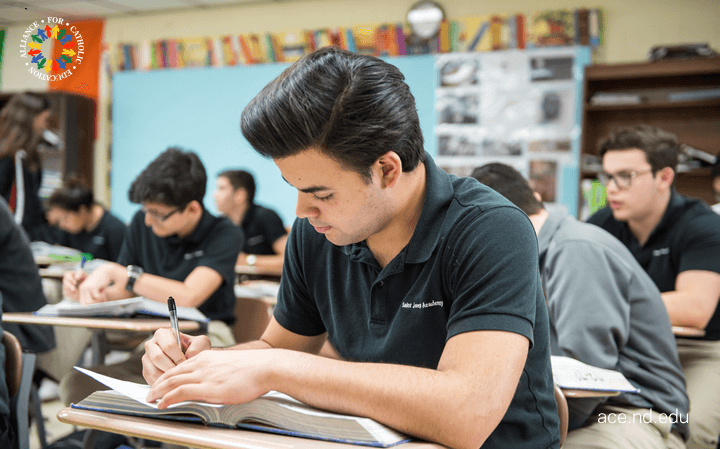I was watching an episode of the Big Bang Theory the other day. I'm not sure if you've ever watched that show or other shows by Chuck Lorre, but one screen always has something random on it at the end of the credits. Sometimes it's related to current events, sometimes it's about the episode and its founding in a real-life event, and sometimes it's just nonsensical. For whatever reason, I actually paid attention to that screen when I was watching the last episode. All that was written was, "I don't know what my expectations are until they're not met." This quote struck a nerve with me as I think about this recent Easter season and courage.
"Although we have curriculum maps, mentor teachers, coaches, and school leaders to help us, we are often left in our classrooms and jobs to simply figure it out."
There's no doubt that being a Catholic educator is a difficult, grueling, sometimes thankless, and stressful job. Although we have curriculum maps, mentor teachers, coaches, and school leaders to help us, we are often left in our classrooms and jobs to simply figure it out. Making adjustments and changes on the fly because the students did not understand the material the first time around, or an unexpected field trip or athletic event involved over half of the class, or a student is just not motivated to learn–or, or, or. And then we get a call or email from a parent, student, or colleague concerned about our approach, and we suddenly know what our expectation really was…or maybe I should more appropriately say what their expectation was. Then we are left feeling more stressed, dejected, and lost. After all, most of us give everything to our vocation of education, so it feels unbelievably painful when our well-intended actions are attacked.
Jesus tells us in John 34:13, "I give you a new commandment: love one another. As I have loved you, so you also should love one another." Notice it's not just love, but love as He loved us. And how did He love us? He loved us so deeply it brought Him to the point of ultimate sacrifice–death. But Jesus' death was not the end of the story…and neither is the attack on our well-intended actions!
"It's about never giving up and making those tough decisions that will keep us and our students on the course towards college and heaven."
As educators, we also have the most rewarding and fulfilling jobs. We have the joy of seeing a student "get it" for the first time–that magical moment of true understanding. We have the joy of seeing a young person grow and mature from a boy or girl to a young man or woman. We have the joy of seeing these young men and women find the courage and strength to change their world, and then take their first steps into the world as they move on to college. But most joyfully, we get those moments when former students return to tell us about how they are doing and what they have made of their life.
So the daily emails, phone calls, and exhaustion are only one part of the story–just like Christ's death was only one part of the story. And what's the gap between the emails and the students coming back to us in the future? Courage. Courage to fight the fight on a daily basis, holding firm to our love of Jesus with a laser focus on our mission of Catholic education. It's about finding joy in pain, happiness in sorrow, and most importantly love in hate. It's about finding the courage to keep moving forward, step by step and day by day. It's about never giving up and making those tough decisions that will keep us and our students on the course towards college and heaven. It's about trying to help–from a place of love–a student, parent, or colleague learn from their mistakes. It's about continuing to learn all we can in order to do our jobs most effectively. In short, it's about the courage to bear our cross.
David Sorkin is the assistant principal at Seton Catholic Preparatory High School in Chandler, Arizona, and an adjunct faculty member of the Mary Ann Remick Leadership Program. He's also a graduate of RLP.
 Alliance for Catholic Education
Alliance for Catholic Education
